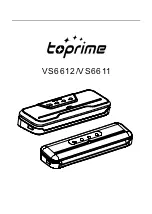
29
EN
Bacteria
– Results in an unpleasant odor, discoloration and/or soft or slimy texture.
Under the right conditions, clostridium botulinum (the organism that causes Botulism) can
grow without air and cannot be detected by smell or taste. Although it is extremely rare,
it can be very dangerous.
As with any other storage container, it is important to inspect food for spoilage prior to
consuming.
To preserve foods safely, it is important to maintain low temperatures. You can
significantly reduce the growth of microorganisms at temperatures of 4ºC or below.
Freezing at -17ºC does not kill microorganisms, but stops them from growing. For long-
term storage, always freeze perishable foods that have been vacuum packaged.
It is important to note that vacuum packaging cannot reverse the deterioration of foods.
It can only slow down changes in quality. It is difficult to predict how long foods will
retain their top-quality flavor, appearance or texture because it depends on the age and
the condition of the food on the day it was vacuumed packaged.
Note
: vacuum packaging is not a substitute for refrigeration or freezing. Any
perishable foods that require refrigeration must still be refrigerated or frozen after
vacuum packaging.
Preparation Guidelines
Vegetables need to be blanched before vacuum packaging. This process stops the
enzyme action, which leads to loss of flavor, color and texture. To blanch vegetables,
place them in boiling water or in the microwave until they are cooked, but still crisp.
Then, immerse the vegetables in cold water to stop the cooking process. Finally, dry the
vegetables on a towel before vacuum packaging. Cruciferous vegetables (broccoli,
sprouts, cabbage, cauliflower, kale, turnips) naturally emit gases during storage.
Therefore, after blanching, they must be stored in the freezer only.















































